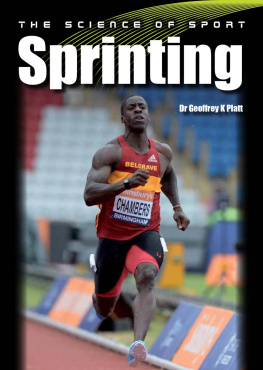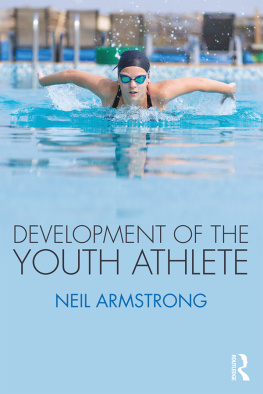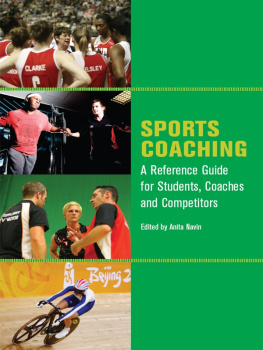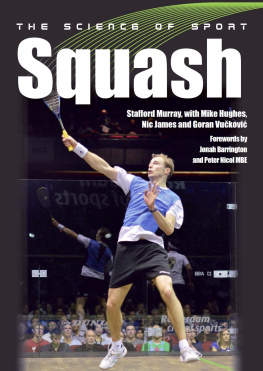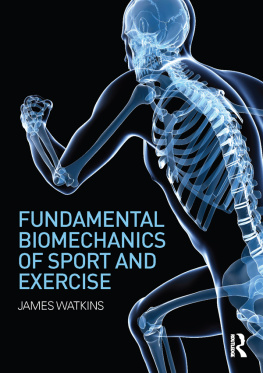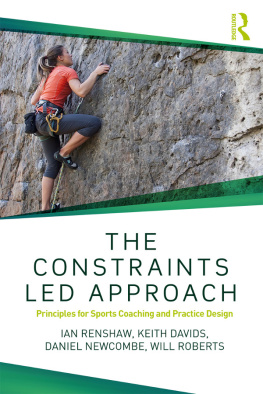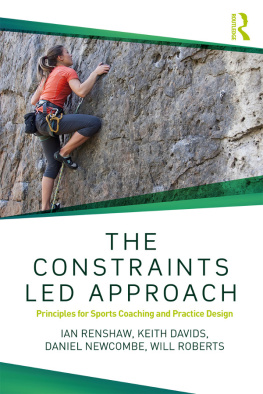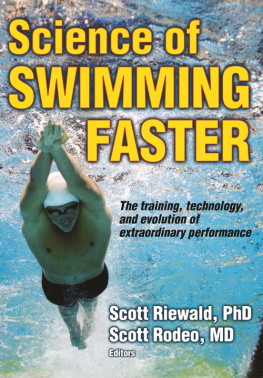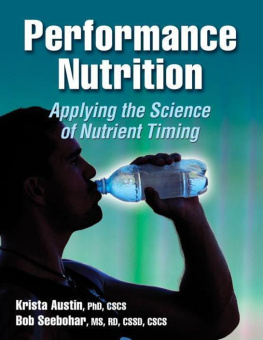THE SCIENCE OF SPORT
Sprinting
Dr Geoffrey K Platt

First published in 2015 by
The Crowood Press Ltd
Ramsbury, Marlborough
Wiltshire SN8 2HR
www.crowood.com
This e-book published 2015
Geoffrey K. Platt 2015
All rights reserved. No part of this publication may be reproduced or transmitted in any form or by any means, electronic or mechanical, including photocopy, recording, or any information storage and retrieval system, without permission in writing from the publishers.
British Library Cataloguing-in-Publication Data
A catalogue record for this book is available from the British Library.
ISBN 978 1 84797 942 1
CONTENTS
AUTHORS AND CONTRIBUTORS
Dr Geoffrey K. Platt is an international coach, lecturer and author. He is retained by the International Olympic Committee (IOC), the World Anti-Doping Agency (WADA), the International Weightlifting Federation (IWF) and the International Powerlifting Federation (IPF) to lecture on a wide range of subjects relating to high performance sport. He is a former principal lecturer in Sports Coaching Science.
Professor Morteza Shahbazi Moghaddam is an emeritus professor from Tehran University. He received his PhD from Paris University in Electronics in 1974, but since 1986 he has been involved with biomechanics, and following a sabbatical at the Centre for Aquatic Research at Edinburgh University in 2001, has continued there as a visiting professor, undertaking research and publishing forty-five papers in this domain.
Dr Mohsen Shafizadeh is a senior lecturer in Skill Acquisition and Performance Analysis at Sheffield Hallam University. He is a qualified athletics coach and technical official in Iran; also a BASES-accredited sports scientist and ISPAS-accredited performance analyst.
Dr Gino di Matteo qualified as a physiotherapist in 1985 before completing a Masters in 1994 and a doctorate in 1999. He is currently the Director of Clinical Services for TW1 Physiotherapy Ltd, and lectures to physicians, surgeons and other healthcare professionals. He has been involved with the assessment and management of injured athletes of all levels, including premiership football and rugby, and lectured to medics preparing for the 2012 Olympics, specializing in the biomechanical assessment of musculoskeletal injuries.
Dr Justin Roberts (Senior Lecturer/Researcher specializing in Performance Nutrition and Physiology at Anglia Ruskin University, Cambridge. He is an Accredited Sport and Exercise Physiologist and Chartered Scientist with the British Association of Sport and Exercise Sciences (BASES). Dr Roberts is also an applied nutritionist registered with the British Association of Applied Nutrition and Nutritional Therapy (BANT), the Nutrition Therapy Council (NTC) and the Complementary and Natural Healthcare Council (CNHC).
Professor Dave Collins is the chair and director of the Institute of Coaching and Performance (IcaP). As an applied performance psychologist, Dave has worked with over sixty world and Olympic medallists, plus a number of professional and international athletes in various team sports. In previous careers he served as Performance Director of UK Athletics, as a teacher and teacher educator, and as a director of coaching for various sports and academies.
Dr Andrew Cruickshank is an ex-professional footballer and current chartered sport psychologist who has worked in elite athletics, motor sport, judo, golf, football, rugby, mountain biking and netball. As an academic, Andrew has a PhD in applied sport psychology, has published work in various journals, and contributed to book chapters on high performance sport.
Susan Giblin is a performance scientist, and a researcher at the Institute of Coaching and Performance (ICaP) at UCLan, specializing in psychomotor skill development. She is a certified strength and conditioning specialist (NSCA) with applied coaching experience to Olympic level. She is currently still in training as a sprints athlete.
Tom McNab is a former Principal National Coach for Athletics. As well as coaching British athletics teams, he also worked with the British Olympic bobsleigh team and the England rugby squad at the 1992 World Cup. In that same year Tom was voted British Coach of the Year. Tom now has a successful career as a novelist and motivational public speaker.
Wilf Paish was one of Britains most successful athletics coaches in a career spanning five decades. As well as being Principal National Coach for Athletics, he also coached many top class athletes, most notably Tessa Sanderson, who won javelin gold at the 1984 Los Angeles Olympics. Wilf died in 2010.
CHAPTER 1
AN INTRODUCTION TO THE SCIENCE OF SPRINTING
by Dr Geoffrey K. Platt
This book is about running as fast as is humanly possible. Some of the best sprinters in the world have combined with some of the best coaches and some of the best injury specialists and some of the best sports scientists to review recent work in the area, and to give their best advice on the direction in which sprinting should develop over the next twenty years.
Since the 1880s, sport has become organized, structured and very competitive. Athletes are no longer the only participants in sport who want to be the best in their field: now coaches, administrators, technical officials, even sports doctors devote their lives, night and day, to being as good as they can be.
THE BACKGROUND TO SPORTS SCIENCE
The end of World War II in 1945 saw the formation of the German Democratic Republic (GDR) East Germany. Sitting in the shadow of the much larger Federal German Republic (FDR) West Germany the East Germans were keen to show what they could do, and that they could compete against their much larger neighbours. They established the best sports-science set-up that the world has ever seen.
In 1981, Australia formed the Australian Institute of Sport (AIS), which has been the cradle of Australias national sports system one that is recognized the world over for its ability to identify, develop and produce world, Olympic and Paralympic champions. The Australians showed that sports science research was not limited to Eastern Europe, and also demonstrated what could be achieved in sports performance with strong investment.
In 2002, England started the English Institute of Sport, with similar organizations in each of the other Home Countries, and Olympic sports have leapt ahead and are leading the way in the appliance of expertise, and this is down to the breadth of experts they employ, many of whom have been young graduates employed in specific roles.
In the words of Sir Dave Brailsford, Performance Director of British Cycling, Sport science and medicine are inextricably linked to performance and are areas that British Cycling has continued to embrace.
In this book, leading athletes, coaches, injury specialists and sports scientists will explain the science and medicine that will move sprinting forwards over the next twenty years.
Definition of Terms
No introduction would be complete unless it defines the terms on which it relies:

